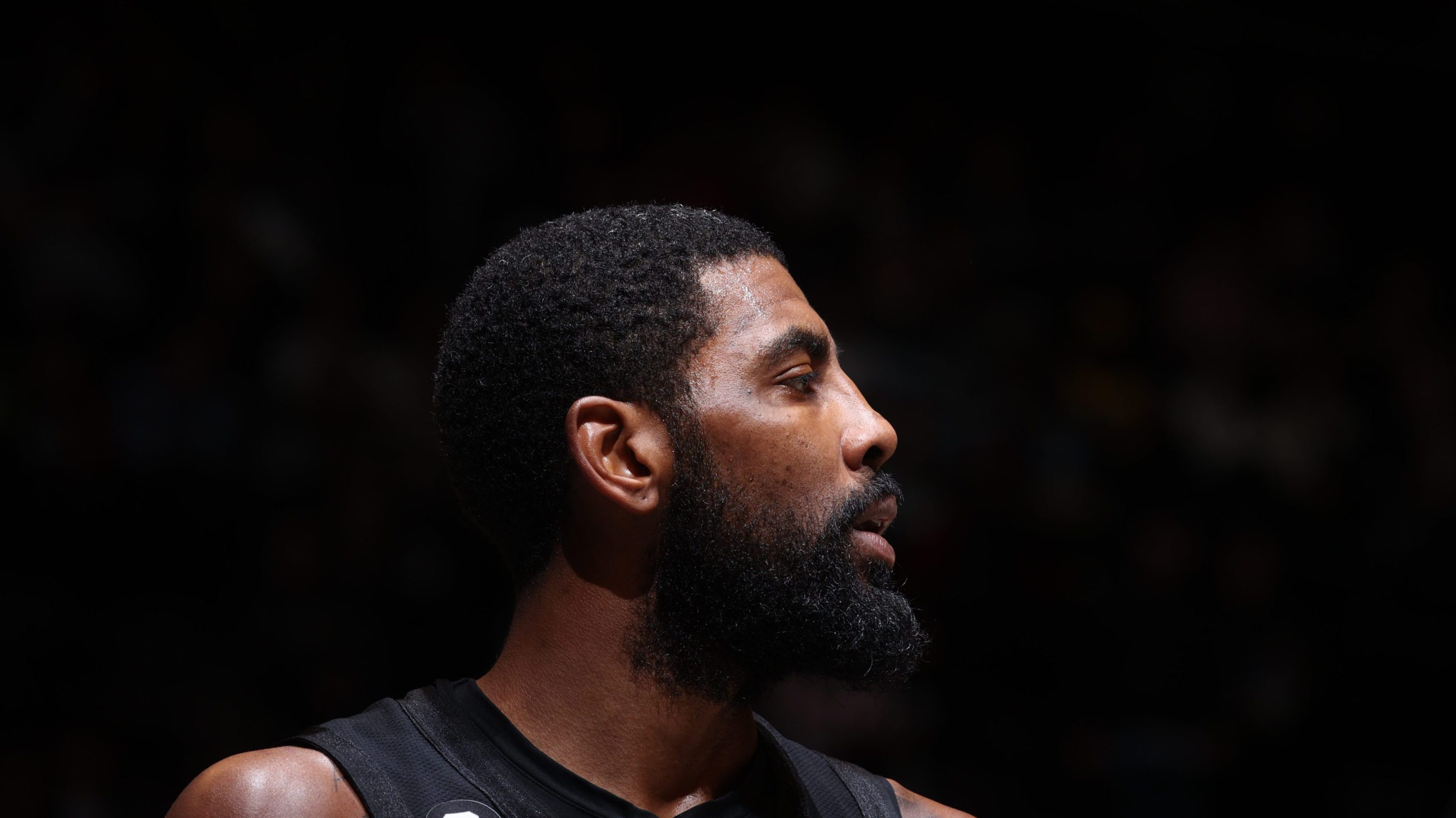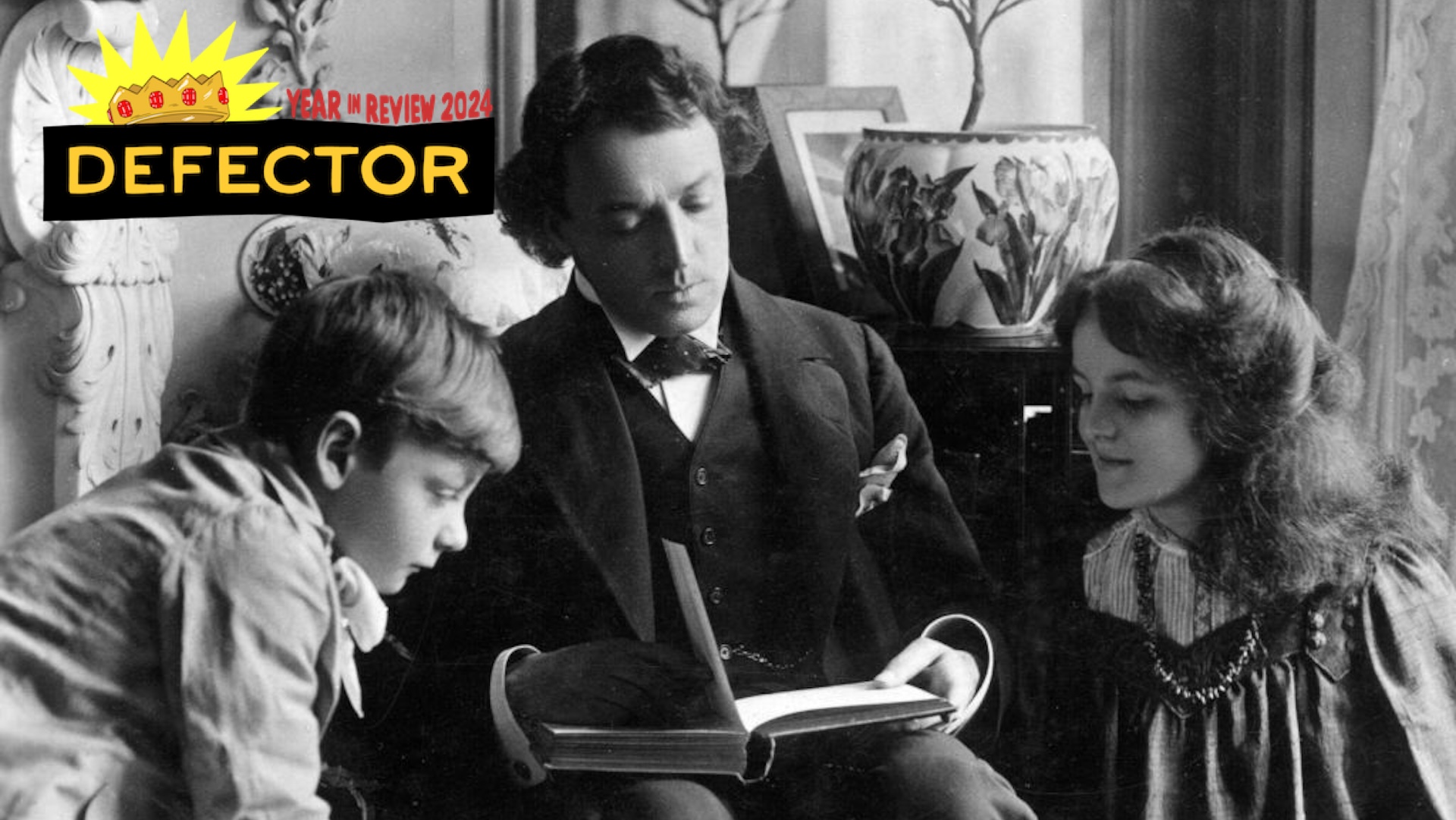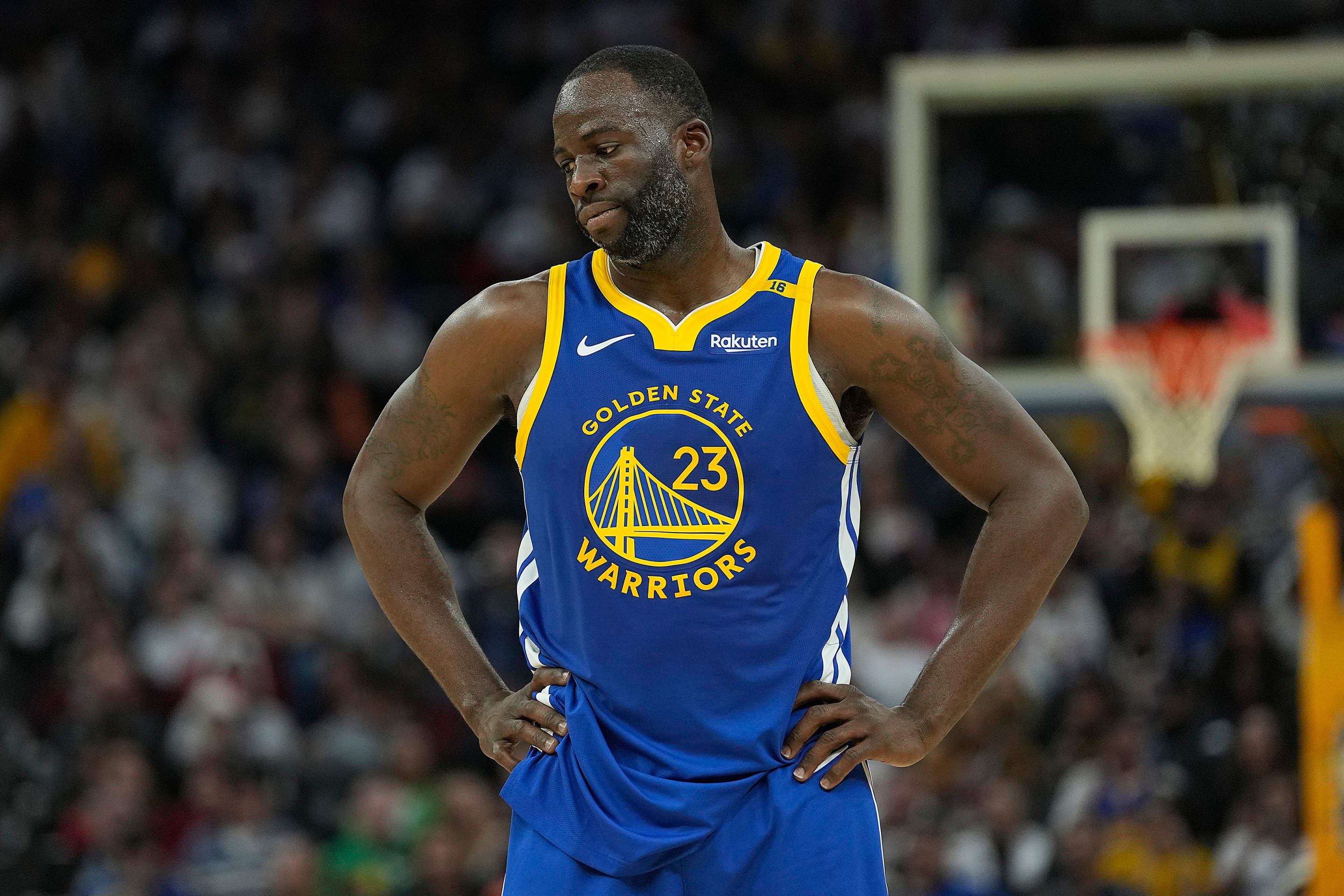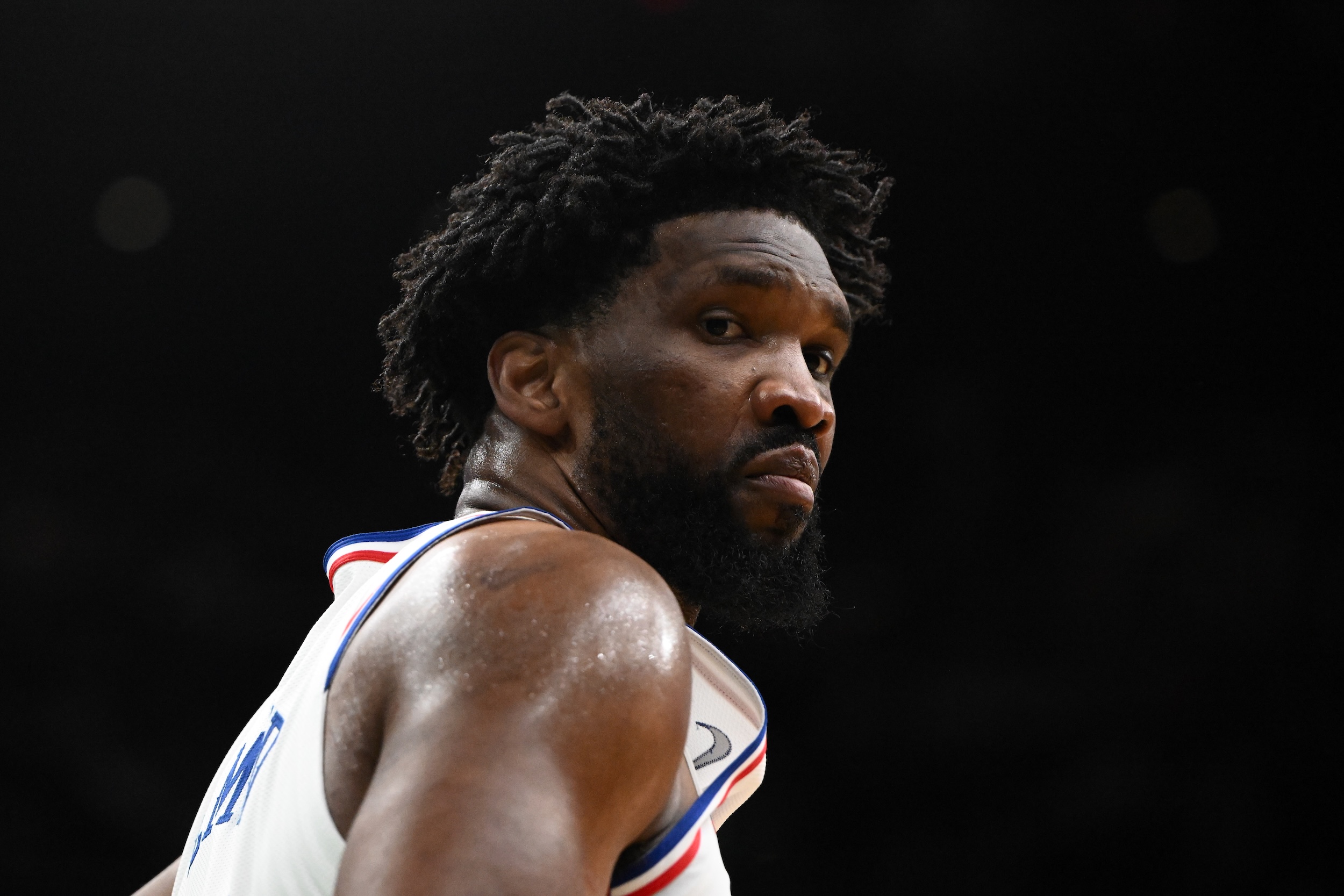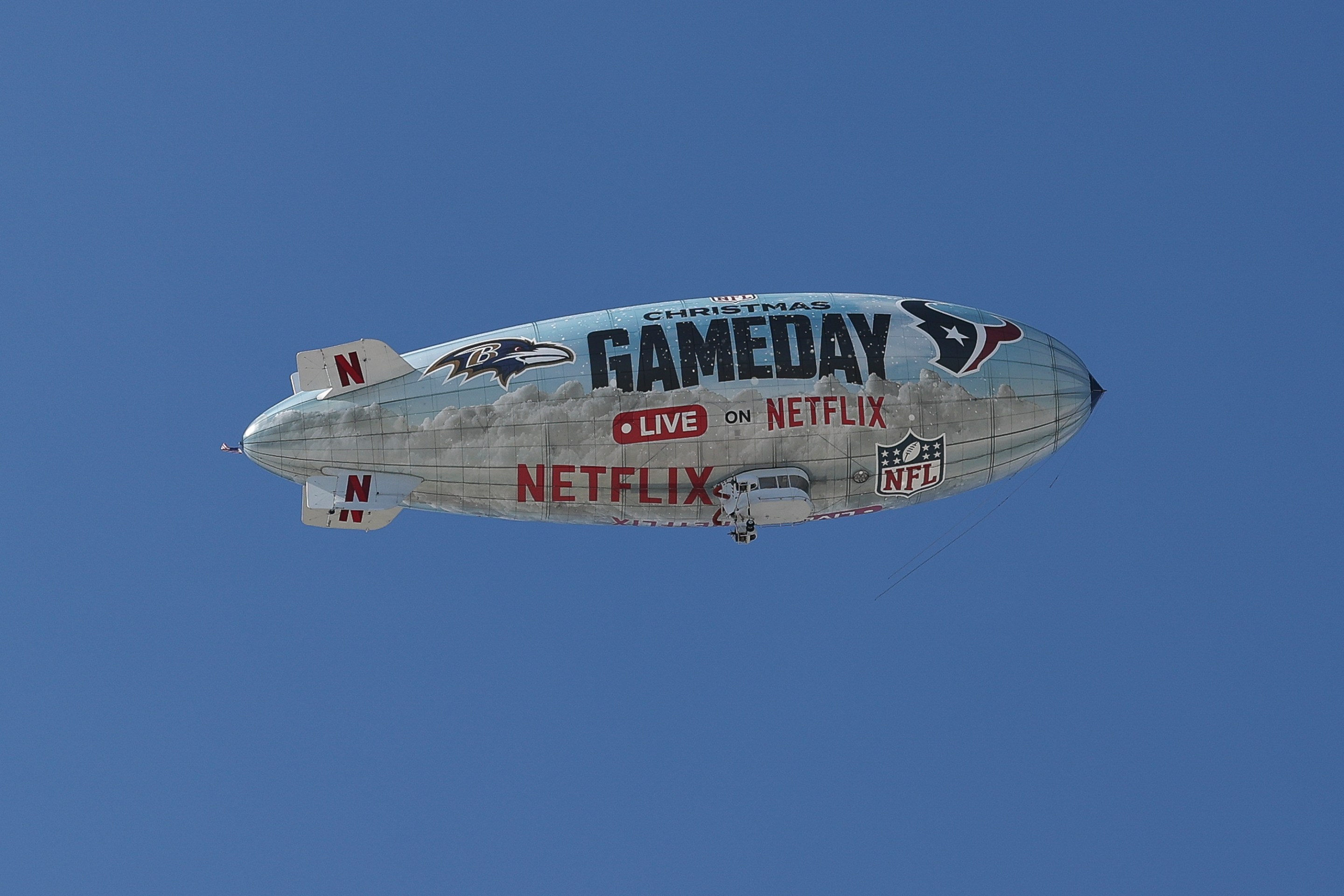On Monday night, Kyrie Irving took the court for the Brooklyn Nets and it was almost normal. The game opened with an elaborate announcement of the starting five, complete with dramatic lighting and music. Irving's name was announced last. And then the lights came up and it was a regular-season game against the Indiana Pacers. Irving played 43 minutes, more than any other starter, and the announcers dropped factoids where appropriate while Irving did all the things the Nets pay him a base salary of $36 million this year to do, up to and including leading his team to a win. To a casual viewer, it would have looked like any other game, on any other night.
Except for the purple shirts. According to Nets reporter Alec Sturm, eight fans sat courtside for the game, several wearing kippot, all wearing purple t-shirts that said in all capital letters "FIGHT ANTISEMITISM." It was nearly the end of the third quarter when the broadcasters talked about the shirts and the people wearing them, with announcer Ian Eagle noting, as Irving took two free throws, that fighting antisemitism is "something I think we can all agree upon" and that the t-shirts are "something Kyrie will have to get used to." What this message had to do with Irving would have been unclear—unless you happened to catch the moment, about four minutes into the first quarter, when Eagle mentioned that Irving had "taken down his post that linked to a movie with antisemitic themes." For most of the game, Irving's decision to make that post, and then to defend it with his characteristic defiant opacity, was consigned to the background, just like those shirts. An NBA game was happening on in the foreground.
Last Thursday night, Irving shared a tweet linking out to a movie called Hebrews To Negroes; he has more than 4 million followers on the platform. ESPN's Pablo Torre watched the movie and read the related book, which saved me the heartache of having to absorb lies deployed throughout history to murder people like me. Here is what Torre found.
I started watching the movie Kyrie tweeted out to prepare for today's episode of @debatable. And if you were wondering exactly how insanely anti-Semitic it is, just know that they show this quote from "Adolph Hitler," as such: pic.twitter.com/1Z8bzKzFen
— Pablo Torre (@PabloTorre) October 31, 2022
P.S. This is from the book that the movie is based on. It's written by the same director, and it has the exact same title. He calls the fact that 6 million Jews were killed during the Holocaust one of "five major falsehoods" (and blames "the Jewish controlled media"). Not subtle! pic.twitter.com/1rorzaIaDl
— Pablo Torre (@PabloTorre) October 31, 2022
Antisemitism has been embedded in western culture for millennia; as Atlantic writer Adam Serwer recently put it on a Jewish Currents podcast discussing Kanye West, "It’s already in the water and some people get poisoned by it." That Irving shared this video is not any sort of "proof" that antisemitism is worse in the black community. It's not. Antisemitism exists in the black community for the same reason it exists in the white community and in all communities, which is as a sort of poisonous hand-me-down explanation for why the world is the way it is—One Weird Trick that explains everything, incorrectly. What Irving shared is steeped in the rhetoric shared by the radical faction of the Black Hebrew Israelites. (Not all Black Hebrew Israelites believe what's in what Irving shared.) Irving isn't the first person to publicly give a platform to this form of antisemitism; Nick Cannon has shared it on his podcast, and West has almost compulsively continued to push similar conspiracy theories seemingly wherever he can. As the filmmaker and writer Rebecca Pierce explained back in 2019 when writing about a deadly shooting in a New Jersey kosher market, "'Black antisemitism' simply reflects broader, and deeply rooted, American antisemitism."
Best I can tell, nobody asked Irving about that post until after Rolling Stone put up an article on Saturday about the tweet that detailed the many antisemitic tropes in the movie and books it mentions. After the Nets played on Saturday, reporter Nick Friedell asked Irving about the tweet. The reply Irving gave was both nonsense and utterly off-the-rack; anyone who has experienced antisemitism has also experienced just this sort of evasive, empty blather from antisemites when they're called on it. It's all there—first Irving's insistence that he was just innocently putting stuff out there, then the pivot to claiming he was being "dehumanized" by being asked about the extremely antisemitic movie he shared with his millions of followers, and finally saying "I don't have to understand anything from you." Irving closed, grandly, by implying that Friedell only asked the question to generate a viral clip. (In a longer cut of the video, you can hear Irving say that he did watch the video, then adding, "I had a lot of time last year to read a lot, to read a whole bunch, good and bad about the truth of our world." Unsaid in that was the main reason he had all that time on his hands, which was that Irving couldn't play for the Nets because he refused to get vaccinated against COVID-19.)
Kyrie Irving going back and forth with @NickFriedell during the Nets postgame presser 😳#NBATwitter #NetsWorld pic.twitter.com/Mn2dSsirSN
— 𝙏𝙖𝙡𝙠𝙞𝙣’ 𝙉𝘽𝘼 (@_Talkin_NBA) October 30, 2022
My first thought upon watching this video was how this all tracked, and how familiar Irving casually sharing antisemitism online and then professing shock that anyone thought this was a problem felt. In the same press conference, Irving does his best to deflect questions about why he doesn't stand with the noted conspiracy theorist Alex Jones, who recently was ordered to pay nearly $1 billion to the families of the children massacred at Sandy Hook Elementary; these were damages for Jones having spent years spreading lies that the massacre was a hoax. Yes, Irving allowed, he had shared some of Jones's content. Also, yes, Irving said that he thought what Jones said about "secret societies" was true. But that doesn't mean that he endorsed it. It just was something he put up there. People noticed that post, too, but Irving had never previously been called to account for it. Once you've spread the work of one man who peddles in unfounded, disproved, noxious conspiracy theories—and have done so without rebuke—why wouldn't you try out another? Here, too, there is nothing new.
It was not Irving's actions that shocked me. I've been a Jew all my life, and so I've been around antisemitism all my life. Nothing about it surprises me. It is always there. As with the banner hung over a busy Los Angeles freeway that said "Kanye is right about the Jews," which was the work of a group that's been hanging such banners for years, it's just a question of whether other people are paying attention.
There are a lot of versions of this, and I have experience with many of them. I have heard that I, as a Jew, have hidden horns. (We don't, which is unfortunate because that sounds cool.) I have been told that I am here to replace all the good, white Christians. (That would be news to my family, who definitely want to know why I still don't have children.) I have heard that the Jews control all the money in the world. (That would be news to my bank account!) These are all antiques by now, but there is always another mutation taking antisemitism in another direction—denying the 6 million deaths in the Holocaust, saying Jews control the media, or suggesting that Jews were the sole, secret force behind the trans-Atlantic slave trade—but the core of it remains the same. Your problems, your suffering, your pain, can be blamed on the Jews. It is because of the Jew that you must suffer; more than that, they are making it happen.
If I can divorce myself from my own life and identity for a minute, I can see the comfort in all this. Life is hard, and confusing, and often brutally unfair; how many of us have found ourselves facing the consequences of someone else's horrible actions as they come racing downhill at us. There's relief in conspiracy theories, which is finally what antisemitism is. Antisemitism's worldview is not the correct answer, and it doesn't solve anything, but it orders the chaos, and gives the person who chooses to believe it the opportunity to point a finger and say, "It's all your fault." This is why there might always be antisemitism. It would be easy enough to understand, except that I am the person at the end of that conspiracy theory. I am the Jew.
What does shock me, still, is when antisemitism happens and people respond as if nothing important happened—as if it was just a bad take, a wrong link, a misstep on some misguided journey. Perpetuating the language that has been used to murder Jews for thousands of years does not—and has never—come from a place of understanding, but it is also not Just A Misunderstanding.
(A quick but necessary aside. It is not antisemitic to criticize the state of Israel nor the Zionist movement. As with any country, Israel can and should be scrutinized. And Israel deserves the scrutiny of the world for maintaining an apartheid state, which it does through laws and state violence targeted solely at Palestinians for the point of oppressing them. To name just a few sources, Amnesty International, Human Rights Watch, and B'Tselem-The Israeli Information Center for Human Rights in the Occupied Territories have affirmed and documented this. This, just as much as pointing out that what Irving shared is antisemitic and dangerous, is a fact. Conflating criticism of Israel with antisemitism is cynical and unhelpful.)
What Kyrie Irving thinks about me and my religion is not important to me, really. What hurt my heart in ways that still feel difficult to untangle was what came after. Sure, the Nets owner made a statement, and Nets broadcaster Richard Jefferson was critical of Irving on the air. The NBA issued a statement. The NBPA, where Irving is a vice president, also issued a statement. Everyone in basketball seemed very happy to issue statements—and then let what happened slide into the ether. (Notably, when reserve Miami Heat center Meyers Leonard used an antisemitic slur during a Twitch livestream last year, the league suspended him for a week and fined him $50,000. Both Heat coach Erik Spoelstra and longtime player Udonis Haslem spoke forcefully and swiftly about not tolerating antisemitic speech in the organization. Leonard, a marginal player, seems to be out of the NBA.)
"There's always an opportunity for us to grow and understand new perspectives," Steve Nash said before Monday's game. "I think the organization is trying to take that stance where we can communicate through this. And try to all come out in a better position and both more understanding and more empathy for every side of this debate and situation." This reduction—the decision to share media to millions of people that propagated the lie that wide-scale, government-sanctioned, documented murder of Jews didn't happen during the Holocaust, then shrinking it down to a "perspective" in a "debate"—is taking antisemitism and saying, nah, this isn't a dangerous conspiracy used for thousands of years to oppress people. It's just part of the discourse. On Tuesday, Nash resigned.
Nash's statement was somehow not even the most incoherent of this miserable news cycle. Before the broadcast, Bally Sports NBA insider Brandon "Scoop B" Robinson used his own platform to defend Irving, saying there was "context" to what Irving have tweeted out, and that people close to Irving insist he is not antisemitic, and that the video Irving shared was "part of his journey." He called the anger at Irving "in poor taste" because Irving is in a contract year, and suggested the only reason it had become news was that the Nets weren't winning enough games. He concluded by suggesting that this all be filed away under "kitchen table talk conversation." Robinson later deleted the video and apologized the following day.
Impossible to ignore in all this was that these are, after all, the Brooklyn Nets, a team whose entire brand, from the moment they left New Jersey, has revolved around how New York they are. The brand has always been just that, but the New York City metro area really is home to the second-largest Jewish population in the world, and a place whose famed bagels, and pastrami, and lox largely came by way of Ashkenazi Jewish immigrants, and whose early labor history was driven to a great degree by those same Jews. It is a city where non-Jews will joke with me that, hey, they might not be Jewish but they know how to spell Moskovitz. (It's one version of a Yiddish last name that roughly translates to descendent of Moses.) What Irving did would be unacceptable from any pro athlete, on any professional team. To see it from a Brooklyn team, though, only takes the pain and turns it up several more degrees.
There is nothing any Jew can say to disprove the beliefs of an antisemite. Trust me, I have tried. No explanation will soothe them; they simply have too much riding on it. No amount of historical documentation will be enough. I can say I don't have horns, but all that proves is that I am hiding my horns. I am hiding my control of the media, of Hollywood, of the weather; I am hiding my vast connections to a global cabal that controls all the money. I have thought often, while writing this, about this passage from the Jean-Paul Sartre essay "The Antisemite And The Jew," which was published in full in 1946. The essay is deeply flawed—multiple times in it Sartre himself peddles in antisemitic stereotypes. But his analysis of why talking a person out of their antisemitism seems so hard remains true.
Never believe that anti-Semites are completely unaware of the absurdity of their replies. They know that their remarks are frivolous, open to challenge. But they are amusing themselves, for it is their adversary who is obliged to use words responsibly, since he believes in words. The anti-Semites have the right to play. They even like to play with discourse for, by giving ridiculous reasons, they discredit the seriousness of their interlocutors. They delight in acting in bad faith, since they seek not to persuade by sound argument but to intimidate and disconcert. If you press them too closely, they will abruptly fall silent, loftily indicating by some phrase that the time for argument is past. It is not that they are afraid of being convinced. They fear only to appear ridiculous or to prejudice by their embarrassment their hope of winning over some third person to their side. If then, as we have been able to observe, the anti-Semite is impervious to reason and to experience, it is not because his conviction is strong. Rather his conviction is strong because he has chosen first of all to be impervious.
"Impervious" certainly describes Irving, and described his brand of strident dilettantism well even before it turned, maybe inevitably, in this direction. It would also describe the entire debacle of how the Nets returned to the court on Monday night, and continued about their business on Tuesday. (That business involved reportedly moving toward hiring Ime Udoka, currently suspended by the Boston Celtics for sexual misconduct, as their next coach.) Impervious to what had happened. Impervious to what it all meant. Impervious to the history of their own city.
"Early on in the semester, I tell the students the two streams flowing constantly under the floorboards of western culture and American culture. One is the stream of anti-black racism. The other one, right next to it, is the stream of antisemitism," Harvard professor Henry Louis Gates Jr. recently said on the WTF podcast. "And they are activated by the same forces, which are—once you strip away all of the apparent causes, excuses, explanations gets down to economics. It all flows from economic insecurity, economic jealousy, and economic motivations."
During Monday's broadcast, Eagle added that there are people with the Nets who want to have a "an actual dialogue with Kyrie about this, and would like to hear an acknowledgement from Kyrie about the reaction and an apology as well." Relistening to that on Tuesday morning, hours after the possible hiring of Udoka became news, I felt a familiar pang in my heart. I thought about all the Jewish team employees who are, like me, giving themselves the annual refresher course on the history of antisemitism so they can explain it to others. I thought about all the women who work for the Nets and the questions they rightly have about why the Nets are looking to bring in Udoka. This would be the place to say something inspiring, or just comforting—something about how this is the slow work toward change, or whatever. But I can't see any evidence that Irving, or anyone with any real power within the Nets organization, is listening. They are moving ahead, impervious, through the world that imperviousness has made.
